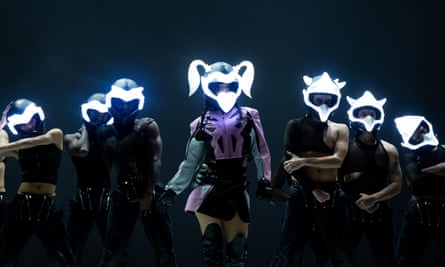There’s a meme format going around where an image of an odd-looking fellow – the original being Wayne Rooney in a vacuum-tight suit – is paired with the caption: “No one has ever looked like this before.” Even in an age of endless bootlegs, remakes and copycats, the shock of the new is reassuringly enduring.
And until this year, surely, no one has ever thought they were watching the greatest pop performance in the world as a singer and eight dancers zipped around the stage on micro-scooters while making bunny-ear gestures and shouting: “Chicken teriyaki!”
That is just one slice of the loco pop universe presented by Rosalía during the penultimate show of her 52-date Motomami world tour, a kaleidoscopic fusion of Latin pop, folk tradition, avant-garde beats and TikTok-ready images. Her marathon set –which stretches to more than 30 songs, including a reggaeton block-party set-piece where fans join her on stage – is heralded by revving engines and blinding white lights as she and her troupe march on stage in glowing motorcycle helmets.
Wearing thigh-high boots and a pink and black leather skirt and jacket, the Spanish singer is half biker, half butterfly. The show, like the album, starts with the snarling jazz-reggaeton fusion of Saoko. “Yo soy muy mía, yo me transformo / una mariposa, yo me transformo” she chants (“I’m very much me, I transform myself / a butterfly, I transform myself.”)
Motomami is the sound of Rosalía changing lanes at high speed. In 2018 she scored an unlikely hit with El Mal Querer, an album of eccentric avant-pop that asked what would happen if you cracked open the flamenco tradition with a distorted kick drum and a Justin Timberlake melody. The answer was an armful of Latin Grammys and collaborations with la flor y nata of Spanish- and English-language stars, including Bad Bunny, Billie Eilish, J Balvin and Travis Scott. With superstardom already assured, Motomami – and its associated tour – is focused on the bumping rhythms of reggaeton, dembow, bachata and various other global pop styles.
The stage at the O2 is virtually bare except for two video screens linked up to iPhone cameras that pass between Rosalía and her dancers. They surround her like paparazzi during La Fama, a sensual bachata duet recorded with the Weeknd. Later she brings a camera down to the audience for La Noche de Anoche, a collab with Puerto Rican rapper Bad Bunny, and films the boys in the front row as they nail every line.
There are no outfit changes, there is no backstage. At one point Rosalía slumps into a barber’s chair, hacks off her long black plaits and throws them into the crowd. She wipes off all her makeup yet somehow looks even more pristine than before. Rappers used to say “my life is like a movie”. For Rosalía it’s a TikTok – a platform where she has 28m followers – and we’re all behind the scenes with her. By drawing attention to the screens rather than just using them to display herself, she offers an ironic meta-reading of this glittering popworld while giving us the extreme close-up we truly desire.
If one setup doesn’t appeal, there’s another coming. A grand piano appears for Hentai, a dreamy Disney ballad about riding her boyfriend’s pistola, which she sings into a phone strapped to the keyboard. When she pretends to chew gum, the crowd erupts in recognition of Bizcochito, a hopscotching reggaeton rap which dropped on TikTok with a viral video.
She is fitted with an enormous black flamenco skirt that fans across the entire stage to belt out De Plata, a windswept epic from her flamenco-focused debut album Los Ángeles. Such static moments bring out the extremes of her extraordinary voice. There’s the fluttery soprano with its mohair scratch, gliding through upper registers like another pop icon, Mariah Carey. But lurking beneath is a melismatic wail, scalding as hot metal and moulded by her training at the Catalonia College of Music. Rosalía’s grandmother, a big influence on the album (she appears in a voicenote on G3 N15) had wanted her progeny to be an opera singer like Maria Callas.“I always dreamed of performing at the Royal Albert Hall,” Rosalía tells us wistfully, visibly amazed to be playing a London venue four times its size.
But there’s no time to dwell on what might have been. Squeezing in almost every song from Motomami, Rosalía gives us the sweat from her brow – and presumably her leathers – for almost two solid hours. We dance, we cry, several people faint. The apex of pop artistry is to be everything to everyone; to provide immediate gratification and infinite complexity. The best comparisons seem to involve caveats: is she Frank Ocean with twice as many hits? Björk with dance routines? Kanye with a personality transplant?
Really, Rosalía is in her own lane. It’s one thing to write an album of Spanish pop songs and watch them go viral in countries that don’t speak the language. It’s another to take a sweeping study of folk tradition and alchemise it into a full-beam arena experience. And to do it all on a micro-scooter? Maria Callas could never.

